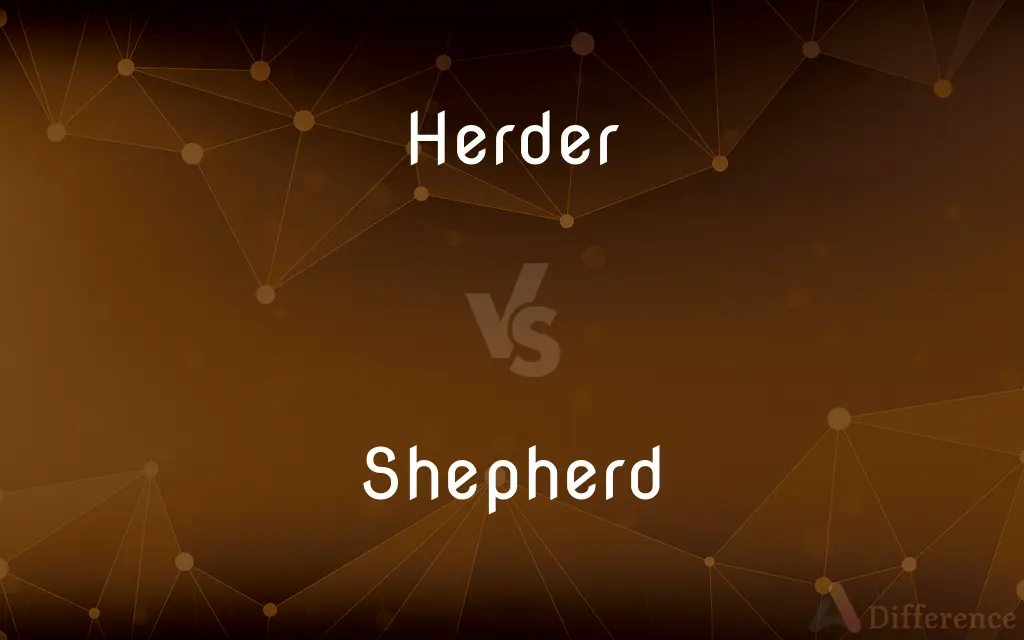Herder vs. Shepherd — What's the Difference?
By Tayyaba Rehman & Maham Liaqat — Updated on March 17, 2024
A herder tends to a variety of livestock, focusing on their overall care, while a shepherd specifically tends to sheep, often with a focus on guiding and protecting the flock.

Difference Between Herder and Shepherd
Table of Contents
ADVERTISEMENT
Key Differences
Herders are involved in the care and management of various types of livestock, including cattle, goats, and sheep, among others. Their responsibilities may vary based on the type of animals they are tending to and the specific needs of those animals. Shepherds, on the other hand, specialize in caring for sheep, and their role often includes guiding the sheep to pasture, protecting them from predators, and managing their breeding.
While herding can take place in a variety of environments, depending on the livestock and geographical location, shepherding is traditionally associated with pastoral scenes, where sheep graze on grasslands or meadows. This distinction highlights how the environment and type of livestock dictate the herder or shepherd's daily activities and responsibilities.
Herders may use different methods and tools based on the animals they tend to, including horses for cattle herding or dogs for both cattle and sheep. Shepherds are particularly known for their use of sheepdogs to help control and protect the flock, illustrating a close working relationship between the shepherd, the dogs, and the sheep.
The skills and knowledge required for herding and shepherding can vary significantly. Herders need to understand the behaviors and needs of a variety of animals, while shepherds often develop a deep understanding of sheep behavior, health, and welfare, reflecting the more specialized nature of shepherding.
Comparison Chart
Focus
Variety of livestock
Specifically sheep
ADVERTISEMENT
Environment
Varied, based on livestock
Primarily pastoral settings
Tools/Methods
Varies by animal (horses, dogs, etc.)
Often involves sheepdogs
Skills/Knowledge
Broad understanding of various animals
Specialized knowledge of sheep
Responsibilities
General care and management
Guiding to pasture, protection, breeding management
Compare with Definitions
Herder
May work in diverse environments, from plains to mountains.
The herder guided the flock through the mountain pass.
Shepherd
A person who cares for, guards, and guides a flock of sheep.
The shepherd led the sheep to a new grazing area at dawn.
Herder
An individual who manages and cares for various types of livestock.
The herder moved the cattle across the field to fresher pastures.
Shepherd
Specializes in knowledge related to sheep health and behavior.
The shepherd noticed the signs of illness in one of the lambs immediately.
Herder
Requires knowledge of different animal behaviors and needs.
As a herder, he was adept at recognizing when the goats needed water.
Shepherd
Often uses sheepdogs to manage and protect the flock.
The shepherd and her sheepdog worked in tandem to corral the sheep.
Herder
Utilizes various tools and methods, including animals like horses and dogs.
The herder's skilled use of herding dogs kept the sheep together.
Shepherd
Typically works in grasslands or pastoral settings.
The shepherd's day began long before the village woke, out in the meadows.
Herder
Focuses on the overall well-being and management of the livestock.
The herder's main concern was the health and safety of the livestock under his care.
Shepherd
Responsibilities include managing the breeding and ensuring the safety of the sheep.
The shepherd was vigilant in protecting the flock from predators at night.
Herder
A herder is a pastoral worker responsible for the care and management of a herd or flock of domestic animals, usually on open pasture. It is particularly associated with nomadic or transhumant management of stock, or with common land grazing.
Shepherd
A shepherd or sheepherder is a person who tends, herds, feeds, or guards herds of sheep. Shepherd derives from Old English sceaphierde (sceap 'sheep' + hierde 'herder').
Herder
A group of cattle or other large herbivorous mammals of a single kind kept together for a specific purpose.
Shepherd
A person who tends and rears sheep.
Herder
A number of wild animals of one species, especially large herbivorous mammals, that remain together as a group
A herd of elephants.
Shepherd
Tend (sheep) as a shepherd.
Herder
A large number of people; a crowd
A herd of stranded passengers.
Shepherd
Guide or direct in a particular direction
I shepherded them through the door
Herder
The multitude of common people regarded as a mass
"It is the luxurious and dissipated who set the fashions which the herd so diligently follow" (Henry David Thoreau).
Shepherd
One who herds, guards, and tends sheep.
Herder
To come together in a herd
The sheep herded for warmth.
Shepherd
One who cares for and guides a group of people, as a minister or teacher.
Herder
To gather, keep, or drive (animals) in a herd.
Shepherd
A German shepherd.
Herder
To tend (sheep or cattle).
Shepherd
To herd or tend as a shepherd.
Herder
To gather and place into a group or mass
Herded the children into the auditorium.
Shepherd
To guide or lead on a course
The counselors shepherded the campers toward the waterfront.
Herder
One who herds.
Shepherd
To direct or instruct in a certain manner
Shepherded the student through algebra.
Herder
A herdsman.
Shepherd
A person who tends sheep, especially a grazing flock.
Shepherdess (f.)
Herder
German philosopher who advocated intuition over reason (1744-1803)
Shepherd
A male sheep tender
Shepherdess (f.)
Herder
Someone who drives a herd
Shepherd
(figurative) Someone who watches over, looks after, or guides somebody.
Shepherdess (f.)
Shepherd
A male watcher/guardian/guider/leader
Shepherdess (f.)
Shepherd
(figurative) The pastor of a church; one who guides others in religion.
Shepherdess (f.)
Shepherd
A male pastor
Shepherdess (f.)
Shepherd
(poetic) A swain; a rustic male lover.
Shepherd
A German Shepherd.
Shepherd
(transitive) To watch over; to guide.
Shepherd
To obstruct an opponent from getting to the ball, either when a teammate has it or is going for it, or if the ball is about to bounce through the goal or out of bounds.
Shepherd
A man employed in tending, feeding, and guarding sheep, esp. a flock grazing at large.
Shepherd
The pastor of a church; one with the religious guidance of others.
Shepherd
To tend as a shepherd; to guard, herd, lead, or drive, as a shepherd.
White, fleecy clouds . . .
Shepherded by the slow, unwilling wind.
Shepherd
A clergyman who watches over a group of people
Shepherd
A herder of sheep (on an open range); someone who keeps the sheep together in a flock
Shepherd
Watch over like a shepherd, as a teacher of her pupils
Shepherd
Tend as a shepherd, as of sheep or goats
Common Curiosities
What tools do shepherds use?
Shepherds often use sheepdogs to help manage and protect their flock, in addition to staffs and other tools for guiding sheep.
What is a herder?
A herder is someone who manages and cares for a variety of livestock, such as cattle, goats, and sheep.
What does a shepherd do?
A shepherd tends to sheep, guiding them to pasture, protecting them from predators, and managing their breeding and overall health.
Can a herder also be a shepherd?
Yes, a herder can also be a shepherd if they specifically tend to sheep as part of their livestock.
How has technology impacted herding and shepherding?
Technology has introduced new tools and methods for managing livestock, such as GPS tracking and more efficient fencing, but the fundamental aspects of herding and shepherding remain rooted in traditional practices.
What skills are important for a herder?
Herders need a broad understanding of animal behavior, needs, and care techniques suitable for various types of livestock.
Do herders and shepherds need formal education?
While formal education can be beneficial, much of the knowledge and skills come from hands-on experience and traditional practices passed down through generations.
How do cultural traditions impact herding and shepherding?
Cultural traditions often shape the practices, techniques, and rituals associated with herding and shepherding, enriching the heritage of these roles.
How do herders and shepherds differ in their roles?
Herders have a broader role managing different types of livestock, while shepherds specialize in the care of sheep.
Are shepherds found in specific regions?
Shepherds are found in many parts of the world, especially in regions with suitable grasslands or pastoral areas for sheep grazing.
How do herders and shepherds contribute to agriculture?
They play a crucial role in managing livestock, which is vital for meat, wool, and dairy production, contributing significantly to agricultural economies.
What challenges do herders face?
Herders face challenges such as changing environmental conditions, predator threats, and managing the health and welfare of a diverse range of animals.
How do herders and shepherds manage large flocks?
They use strategic planning, natural terrain features, and the assistance of working animals like dogs and horses to effectively manage large flocks and herds.
What is the significance of sheepdogs in shepherding?
Sheepdogs are highly valued for their ability to control and protect the flock, working closely with the shepherd to manage the sheep effectively.
What are the environmental impacts of herding and shepherding?
Responsible herding and shepherding practices can support sustainable land management, but overgrazing and improper management can lead to environmental degradation.
Share Your Discovery

Previous Comparison
Neat vs. Smart
Next Comparison
Unalike vs. UnlikeAuthor Spotlight
Written by
Tayyaba RehmanTayyaba Rehman is a distinguished writer, currently serving as a primary contributor to askdifference.com. As a researcher in semantics and etymology, Tayyaba's passion for the complexity of languages and their distinctions has found a perfect home on the platform. Tayyaba delves into the intricacies of language, distinguishing between commonly confused words and phrases, thereby providing clarity for readers worldwide.
Co-written by
Maham Liaqat













































